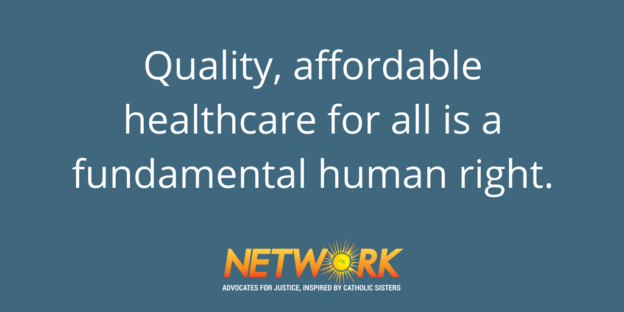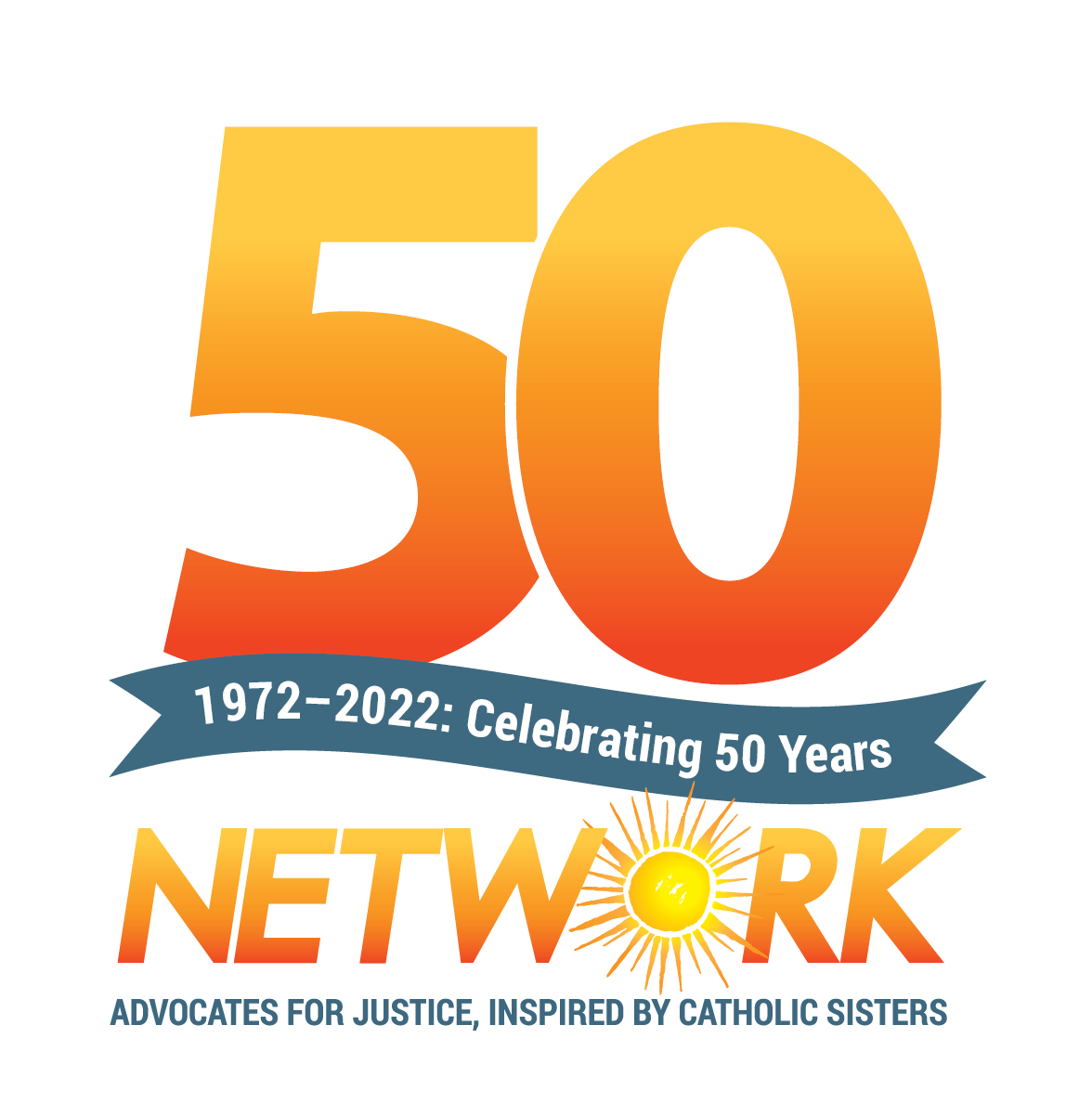
Faith-based Organizations Call for an End-of-Year Funding Package that Prioritizes Health Care for Vulnerable Communities
Laura Peralta-Schulte
December 6, 2022
Dear Member of Congress,
The undersigned organizations from the Washington Interreligious Staff Community (WISC) Health Care Working Group write to urge you to advance an end-of-year funding package that prioritizes health care for vulnerable communities. We are grateful for significant healthcare advancements made since the beginning of the 117th Congress to expand healthcare and create greater health equity, and we believe Congress must take further action to better protect the health and economic security of vulnerable populations.
Guided by the belief that healthcare is a fundamental human right, our organizations work each day to protect existing domestic healthcare programs and increase access to quality, affordable, and equitable health care. Our diverse faith traditions compel us to protect the most vulnerable among us – including individuals in rural areas, low-income people, People of Color, Indigenous people, immigrants, people with disabilities and chronic illnesses, and seniors and children. Many populations, including those listed above, face unique barriers to obtaining comprehensive care and continue to experience significant healthcare disparities.
We urge Congress to pass an end-of-year funding package that includes the following provisions:
Promote Continuous and Expanded Medicaid and CHIP Coverage
Over the past three years, the uninsured rate in the United States has reached a record low and
Medicaid and CHIP enrollment has increased, in part due to continuous coverage requirements implemented under the COVID-19 public health emergency. Given that the public health emergency will likely expire in the coming months, however, these continuous coverage requirements will also cease. Between 5 and 14 million people are expected to lose coverage, and people with disabilities, individuals with limited English proficiency, and those who moved since the pandemic began are at the greatest risk.
Provide 12 Months of Continuous Eligibility for Adults and Children
Because each state manages Medicaid and CHIP programs within federal guidelines, there is
tremendous variation in the scope of services available across the United States. Congress must heed the lessons of recent years and guarantee 12 months of continuous eligibility for adults and children through Medicaid and CHIP to avoid large scale disruption of coverage. Continuous eligibility for children and adults in Medicaid and CHIP ensures that people will remain eligible for Medicaid coverage or for CHIP for a one-year period, regardless of changes in their family’s income. While all vulnerable populations would benefit from this action, there are long-term benefits for children as those with health coverage are more likely to show improved health, lower rates of disability, and greater financial security in adulthood. By guaranteeing continuous Medicaid or CHIP eligibility in every state, Congress can advance health equity by promoting continuity of treatment for low-income individuals who
experience disproportionate rates of health disparities.
Provide 12 Months of Postpartum Coverage
Providing continuous Medicaid coverage for one year postpartum is critical to improving maternal and child health outcomes. While Medicaid finances roughly 40 percent of births in the United States, including 59 percent of births to Hispanic mothers and 65 percent of births to Black mothers, federal law only requires states to continue covering these mothers for 60 days postpartum. One-third of pregnancy-related deaths occur postpartum, including almost 12 percent that occur in the late postpartum period (between 43 and 365 days postpartum). Even as the American Rescue Plan Act allowed states to extend coverage via a state plan amendment, only half of states have or are planning to do so. Yet the need for postpartum medical care does not end after two months; in fact, over 70 percent of postpartum spending occurs between three and twelve months after delivery, as continuous postpartum care is critical for detecting postpartum depression, birth-related complications, and other
chronic conditions. Congress must provide 12 months of postpartum coverage to ensure that mothers can continue accessing life-saving care beyond 60 days.
Increase Medicaid Funding to the U.S. Territories
Due to limitations in the funding statute, Medicaid programs in the territories operate differently than Medicaid programs in the states. First, although federal funding covers a specified share of each state’s Medicaid spending, the territories receive federal funding via temporary fixed block grants that are inadequate to meet their needs. Second, while the federal medical assistance percentage (FMAP) in the states is tied to per capita income, the FMAP in the territories is fixed at artificially low levels, even as per capita income is lower than the poorest states.
As a result of these unequal funding structures, the territories face a looming Medicaid cliff, and even recent improvements to the territories’ Medicaid programs are in jeopardy. While a recent Centers for Medicare and Medicaid Services interpretation determined that future allotments in Puerto Rico (which is still recovering from Hurricane Fiona) should increase from $400 million to $3 billion, Congress is facing pressure to reverse that interpretation, which would cause the 2023 allotment to plummet. Similarly, although the 2022 Consolidated Appropriations Act temporarily increased the FMAP from 55 percent to 76 percent for Puerto Rico and 83 percent for Guam, the U.S. Virgin Islands, the Northern Mariana Islands, and American Samoa, the FMAPs will revert to 55 percent on December 16 absent Congressional action. Given that most residents in the territories are People of Color, this is a racial
justice issue.
Congress must act swiftly to avert the funding cliff. Most urgently, Congress should maintain the CMS interpretation on Puerto Rico, increase the block grant allotments for all territories, and maintain or increase the federal matching rates to align with the states. In the long term, Congress must reform the funding structure for the territories’ Medicaid programs to ensure they can operate at parity with state Medicaid programs.
Addressing the Black Maternal Health Crisis
Congress must also take bold action to address the maternal health crisis that disproportionately affects Communities of Color. Black mothers in the United States three to four times more likely to die from pregnancy-related complications than white women, while Hispanic, Native American, and Asian American and Pacific Islander people experience disproportionate mortality and morbidity rates as well. To address these disparities, Congress must include the Black Maternal Health Momnibus Act (S.346/H.R.959) in end of the year legislation. This package invests in social determinants of health, funds community-based organizations seeking to improve maternal health outcomes, and expands and diversifies the perinatal workforce.
Increase COVID-19 Funding
While the United States has made significant progress since the beginning of COVID-19, the virus poses an ongoing danger to the country. Each day, the United States still experiences hundreds of deaths and thousands of new hospitalizations and reported cases. Long COVID remains a significant threat, already affecting 16 million U.S. adults and has forcing up to 4 million people out of the workforce. As public health protections fade and individual protective measures prove insufficient, the sustained spread places everyone (especially people with disabilities, immunocompromised people, and the elderly) at significant risk.
Continued harm from COVID-19 is not inevitable, and Congress must act swiftly to increase COVID-19 funding. The federal government has already begun to run out of money to continue its pandemic response, resulting in a dramatic contraction in free rapid tests, personal protective equipment, and treatments. The lack of funding has also limited the federal government’s ability to raise awareness about bivalent boosters, monitor cases, and conduct research into new vaccines and treatments.
Three years into the pandemic, we cannot accept this devastation as our new normal. As the United States faces a projected winter surge, and as pediatric emergency rooms and intensive care units become overrun due to RSV and flu, Congress must act quickly to mitigate COVID-19 and ensure that hospitals remain functional. We urge Congress to provide robust funding and partner with federal, state, and local officials to confront the ongoing pandemic.
Conclusion
Health inequities in the United States are the result of a long history of systemic racism, ableism, classism, and other forms of oppression. All our faiths call us to end these stark divides and ensure that everyone has access to quality, affordable, and equitable medical care. Congress must work to promote continuous and expanded Medicaid coverage, increase Medicaid funding to the territories, address the Black maternal health crisis, and increase COVID-19 funding, we will fail to eliminate the inequities that have plagued the United States for far too long. We urge you to support a year-end funding package that advances these priorities.
Sincerely,
Alliance of Baptists
American Muslim Health Professionals
Bread for the World
Church and Society Team, Tennessee-Western Kentucky Conference of the United Methodist Church
Church World Service
Congregation of Our Lady of Charity of the Good Shepherd, U.S. Provinces
Friends Committee on National Legislation
National Advocacy Center of the Sisters of the Good Shepherd
National Council of Jewish Women
National Latino Evangelical Coalition
Network Lobby for Catholic Social Justice
Sisters of Mercy of the Americas Justice Team
Sojourners
The Episcopal Church
The Presbyterian Church (USA): Washington Office of Public Witness & Presbyterian Ministry at the United Nations
The United Methodist Church – General Board of Church and Society
Union for Reform Judaism
Unitarian Universalists for Social Justice
United Church of Christ










